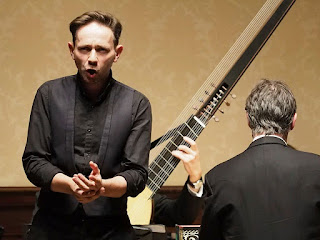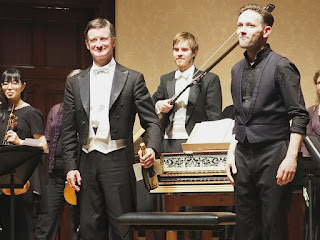 |
| Iestyn Davies, Harry Bicket and the English Concert at the opening of the Wigmore Hall's 2015/16 season - ©Sisi_Burn |
Iestyn Davies, the English Concert, Harry Bicket
The Wigmore Hall
Reviewed by Robert Hugill on Sep 12 2015
Star rating:
Iestyn Davies on strong form in this generous selection of Handel arias opening the Wigmore Hall new season
Last night (Saturday 12 September 2015), the Wigmore Hall's 2015/16 season opened with counter-tenor Iestyn Davies performing a generous selection of Handel arias accompanied by Harry Bicket and the English Concert (leader Nadia Ziener). There was an overture and arias from Handel's Partenope, arias from Rinaldo, Rodelinda and Orlando, with the Passacaille from Radamisto, plus Veracini's Overture No. 2 in F and Porpora's Sinfonia da camera in G Op.2 No. 1.
 |
| Iestyn Davies, Harry Bicket and the English Concert ©Sisi_Burn |
We started with Handel's Partenope, a slightly satirical piece written in 1729 which mixed elements which approach comedy with a serious purpose. The English Concert under Harry Bicket made a surprisingly full sound with 17 players on stage. The opening of the overture had a nice bounce to the stately rhythms, whilst the perky triple time section was very toe-tapping. Iestyn Davies sang three of Arsace's arias, arranged not by where they come in the plot but simply to make a satisfying grouping.
In a hall the size of the Wigmore Hall and with such a sympathetically responsive acoustic, the was no need for Iestyn Davies to push his voice, and there were many moments where the simple beauty of the way the tone emerged and then floated over the orchestra was breathtaking. He sang everything from memory, and each aria in the programme was given a highly characterful delivery, involving the audience in the drama.
The group from Partenope began with Sento amor (Love unrelenting) which was sung with a great beauty of tone and line, with a nice evenness. There was also a lovely sense of dialogue with the orchestra. Chi'io parta (And must I) had an A section which started almost like an accompagnato, a rather neat device to trick the audience, but the aria was a serious one and highly effective, particularly with the contrast to the lyrical B section where Iestyn Davies slimmed his tone down to a finely elegant thread. Finally in this group, Furibondo spira il vento (The furious blast), in which Iestyn Davies gave us the preceding recitative, followed by the vigorous orchestral introduction and then Davies himself with spectacular passage-work. The tempo took no prisoners, and Iestyn Davies displayed great ease and a wonderful evenness in the divisions, and it was characterful too!
 |
| Iestyn Davies, Harry Bicket and the English Concert ©Sisi_Burn |
We finished part one with a pair of arias from Handel's first opera for London, Rinaldo. Cara sposa (My dear beloved) was movingly poignant, with a richly textured, strong tones from the orchestra. Iestyn Davies sang with a finely even long line which contrasted with the busier, questioning strings and a vividly busy B section. Venti turbini (Winds, gales) is a spectacular show-piece give superbly with crisply vigorous strings accompanying Iestyn Davies masterful passage-work.
The second half opened in quieter mode with the accompagnato Pompe vane di morte! (The hollow splendour of Death) and aria Dove sei (Where are you) from Handel's Rodelinda which he wrote for London in 1725. The accompagnato was strong stuff, with Iestyn Davies bringing out the words, and the way aria and recitative overlap is lovely. The aria is relatively simple, and Iestyn Davies did not attempt to do too much, leaving music and artistry to speak for themselves.
 |
| Iestyn Davies, Harry Bicket and the English Concert ©Sisi_Burn |
Finally a sequence of arias from Handel's Orlando which he wrote for London in 1733, it was the last opera which the great castrato Senesino was to sing for Handel. Perhaps the mad scene was a step too far. Iestyn Davies, Harry Bicket and the English Concert started with the mad scene which concludes act two. This is a remarkable sequence of accompagnato, recitative and short, da capo-less arias, including a short passage in 5/8, in which Handel depicts the sudden capricious nature of Orlando's madness. It is tricky to bring off in concert, but was vividly performed with Iestyn Davies giving us some brilliant sudden turns of mood.
Before the final two arias from Orlando, the orchestra played the Passacaille from Radamisto (1720), a lovely passacaglia which was given with a lovely swing to the rhythm. Fammi combattere (Go bid me fight) was wonderfully done, combining the firmly martial with some fine passagework. Then the recitative Gia per la man d'Orlando Now by Orlando's hand) followed by the aria Gia l'ebro mio ciglo (Drugged by this sweet liquid). The recitative was very striking, with accompaniment from just two violas and bass, the two violas lines richly busy and characterful, matched by Iestyn Davies strong delivery of the recitative, this continued into the aria where the simple vocal line (a lullaby effectively) contrasted with the wonderfully rich vocal lines.
After an enthusiastic reception from the audience were were treated to an encore, David's O Lord, whose mercies are numberless from Handel's Saul which Iestyn Davies is performing at Glyndebourne this year.
Elsewhere on this blog:
- The passions are the same: My encounter with Christophe Rousset - interview
- Handel survey: Handel in Italy from Bridget Cunningham - CD review
- Charm and delight: The Cunning Little Vixen from British Youth Opera - opera review
- Technology and class in the development of opera and concert-going - feature article
- Missed opportunity: Prom 65, Alice Coote in Handel - concert review
- Colour and Drama: Mozart and more from Anneke Scott and Ironwood - CD review
- An Avila Diary: My adventures singing triple-choir music by Victoria and Vivanco under Peter Phillips in Spain - feature article
- Serious, independent, fascinating: Music by Edward McGuire from Red Note - CD review
- Charm: Wolf-Ferrari's Suite Veneziana - CD review
- Undeservedly forgotten: Music by Roger Sacheverell Coke - Cd review
- Wartime consolations: Linus Roth plays music by Weinberg and Hartmann which deserves to be heard
- Towering achievement: Beethoven's Diabelli Variations from Nick van Bloss - CD review
- Family connections: Alissa Firsova Russian Emigres - CD review
- Volume 5 of Malcolm Martineau's survey of Poulenc Songs - CD review
- Contemporary opera is alive and well and living in Kings Cross: Tete a Tete festival - opera review
- New voice from Iceland: Hugi Gudmundsson's Calm of the Deep - CD review
- Home











Excellently comprehensive review that brings back to mind much of the detail of a magnificent concert...
ReplyDelete